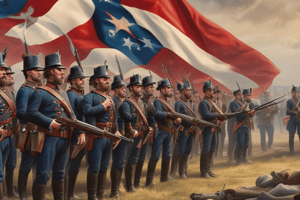Podcast
Questions and Answers
What were two significant advantages the North had over the South in the Civil War?
What were two significant advantages the North had over the South in the Civil War?
Why was the Emancipation Proclamation strategically important for the Union?
Why was the Emancipation Proclamation strategically important for the Union?
How did the actions of Abraham Lincoln impact civil liberties during the Civil War?
How did the actions of Abraham Lincoln impact civil liberties during the Civil War?
What role did African-Americans play in the Union Army during the Civil War?
What role did African-Americans play in the Union Army during the Civil War?
What was the National Banking System, and who was it established under?
What was the National Banking System, and who was it established under?
Flashcards
Emancipation Proclamation
Emancipation Proclamation
Conscription during the Civil War
Conscription during the Civil War
Contraband in the Civil War
Contraband in the Civil War
Border States in the Civil War
Border States in the Civil War
National Banking System
National Banking System
Study Notes
Civil War Advantages
- The North had a larger population, workforce, and military size.
- The North possessed 90% of the industrial capacity.
- The South enjoyed a defensive advantage, needing to maintain a strong position.
- The South's key advantage was military leadership, exemplified by figures like Robert E. Lee and Stonewall Jackson, who led effectively.
Border States
- Key border states included Missouri, Kentucky, Delaware, and Maryland.
- These states held enslaved people but remained loyal to the Union.
- Missouri and Kentucky had citizens who fought for the Union, despite owning slaves.
- Strategically located, these states also contributed to industrial capacity.
Emancipation Proclamation
- The Emancipation Proclamation followed the Battle of Antietam, a decisive Union victory.
- Antietam was the bloodiest single day of the war.
- This victory helped prevent European intervention, as European powers had questioned aiding the Confederacy.
- The Proclamation freed enslaved people in Confederate states.
- The Proclamation did not apply to border states thereby avoiding potential conflicts.
- It strengthened the moral cause of the Union war effort.
- It discouraged European intervention by highlighting anti-slavery sentiment.
Contraband and Conscription
- Contraband referred to runaway enslaved people seeking refuge behind Union lines.
- Enslaved people often joined the Union forces in significant numbers.
- Conscription involved the forced enlistment of citizens into the military—a draft.
- The 1863 NYC draft riots exemplified the class tensions between the wealthy and poor because wealthier individuals could pay for substitutes.
African-Americans in the Civil War
- Approximately 180,000 African Americans served in the Union Army.
- 38,000 African Americans died during the war.
- Frederick Douglass, a former enslaved person, encouraged African Americans to join.
- African American soldiers often received lower pay than their white counterparts.
Lincoln and Civil War Liberties
- To manage the war, President Lincoln suspended habeas corpus, allowing arrests without trials, which violated the Bill of Rights.
- Lincoln expanded the military without congressional approval.
- He suppressed newspapers opposing the war, violating the First Amendment.
- This highlights the limitations on personal liberties during wartime.
Post-Civil War Era
- The National Banking System was established under Lincoln's Secretary of the Treasury, Salmon P. Chase.
- Chase later became Chief Justice of the Supreme Court.
- This system created a standardized national currency.
- The Homestead Act offered 160 acres of land at low cost to encourage westward migration.
- Republicans, controlling Congress, pushed for higher tariffs.
- Democrats opposed tariff increases.
- The Morrill Land-Grant Act granted public land to states for establishing agricultural and mechanical colleges.
- This contributed to the growth of higher education in the US.
Studying That Suits You
Use AI to generate personalized quizzes and flashcards to suit your learning preferences.




